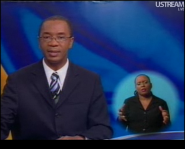In recent days the length of time persons have to remain in prison on remand has been the subject of hot debate. Last week retired jurist Sir Frederick ‘Sleepy’ Smith contributing to a radio call-in show called on the powers that be to do something to ameliorate the situation; ideally a society concerned with justice should want this problem to be nonexistent.
BU agrees with Sir Fred. The timing of the current debate is interesting. It makes one wonder if Sir Fred is using the debate to cast a shadow on the performance of the outgoing Chief Justice (CJ) David Simmons. The Barbados Bar Association (BBA) through its president Leslie Haynes QC has been very generous in its praise of the retiring CJ. Similar praise has been showered by the Barbados Fourth Estate if we are to judge from the articles in the press and commentary by talk show hosts et al. Interestingly Leslie Haynes in responding to Sir Fred’s concern has pointed to the backlog of cases in the magistrates courts as part of the problem. Sir David’s expected response to the spotlight on the Barbados Judiciary was to point blame elsewhere. If we accept Leslie Haynes’s reason for part of the problem of people being on long remand, it begs the question – doesn’t the Magistrate’s Courts fall under Sir David’s purview?
The announcement recently that the CJ was not going to have a two year extension to his contract renewed has provoked discussion galore in Barbados, renewal had always been automatic in the past. To others in the know the force out of the CJ would not have come as a surprise. The quick transition by Sir David from politician to CJ has always been of concern to many Barbadians. Any threat to the perceived independence of the judiciary is likely to have that affect on Barbadians. There is a view that David Simmons, as attorney-general, did everything he could to score political points with the electorate by a number of means. One of these was that he shifted what is now the Greenland Landfill from its logical and originally planned location, in Saint Thomas and his constituency, to the environmentally friendly area of the Scotland District that it has no right being in. However, there was one other that did not succeed and provides us with a true measure of his dedication to achieving political objectives. It concerns the death penalty.
Fully knowing that 98% of the Barbados electorate was in favour of the death penalty (and 98% of the BBA was against it) David Simmons MP at the time launched himself on the platform that he was going to ensure that executions were carried out. Whether you are for or against the death penalty, there has to be a distaste for anyone who would seek to advance their political position and aspirations by using the emotive issue of the death penalty. Most Barbadians have forgotten but the dashed expectations which were fuelled by politician David Simmons still resonate.
Relying on our sources in the legal fraternity the CJ is a competent, but average, jurist and, in days of old might have been considered a master politician. In this day and age, many will regard his main legacy as the advancement of incompetents within the judiciary of Barbados.
As Attorney General, he appointed on the court of appeal someone with a record as registrar which was not flattering, the mess in that department continues to this day. Court files disappearing or being misfiled is not an uncommon event. Who is that registrar? Marie MacCormack, better known today as Lady Simmons.
Should we describe Marie MacCormack’s appointment to the bench as being nepotistic? What about those appointments which many in the legal fraternity label as incompetent – Frank King and Chris Blackman come to mind. Those appointments have been followed by Madame Justices Cornelius and Kentish. All of these appointments have occurred under the watch of Sir David Simmons.
It would be true to say that David Simmons’ tenure as Chief Justice was enhanced by appointments over which he had no input, lawyers and jurists like Errol Chase, Colin Williams and Frederick Waterman were on hand to make Sir David’s court look competent and carry along those regarded as incompetents he had appointed, but only after massive amounts of money had been spent in litigation and appealing the decisions of the lesser lights that he had appointed to the lower courts and magistrates courts. It would be satisfying if our Fourth Estate would do some investigative work, never mind the threat of the ‘lodge’. BU know how things get done in Barbados and despite the political rhetoric of Prime Minister David Thompson nothing significant has changed under his government in the way business is conducted
The legal buzz suggests that it came as no surprise when Sir David appointed his wife to the Court of Appeal to join some our more competent jurists – that way, as judges customarily sit in a panel of three, her lack of any credential other than a law degree would be overruled by far wiser heads. It is suspected that this is why David Simmons finally appointed his friend, Frank King, to the Court of Appeal – so that his title of Most Appealed Judge for every year he was on the bench, would go away due to the fact that others would write the judgments with which he merely had to concur.
Alluded to, Sir David Simmons ought to have expected he would have remained as CJ for another two years given. However, many senior members of the Bar made it clear to the Prime Minister and to the Governor General that he had to go at once, otherwise they would invoke the constitution and have him fired. That is actually what happened, although the Barbados Fourth Estate would never dream of reporting it…..and the legal profession would rather Bajans never knew of the crisis, since it might erode confidence in them.
Justice of Appeal Frederick Waterman is acting CJ and the government is advised to confirm him for the two years remaining of his eligibility. It would suggest continuity within our judiciary which is important. It is noteworthy had former Prime Minister Owen Arthur not given into political skulduggery by appointing David Simmons as Chief Justice in the first place, the choice would have been down to Chase, Waterman or Williams to replace Sir Denys. Better late than never some will say! The big advantage to appointing Waterman as CJ is that it will give the government breathing space to appoint a worth CJ and hopefully distant itself from the questionable decision to have appointed outgoing CJ David Simmons.
Back to Sir Fred’s claim which clearly conflicts with the accolades being showers on Sir David by the Barbados Bar Association and the Fourth Estate. Bear in mind the magistrates courts fall under the purview of the Chief Justice.
In the magistrates courts where remands that could easily be said to breach of that most basic of democratic human rights, habeas corpus , are prevalent and worse. We see magistrates who we forget are mere mortals, having so much power over our lives – and we see some magistrates who ought to be appointed to the High Court continuing to be magistrates, simply because they are not a part of the private fan club or fraternity? Our undervalued magistrates, of which there are not many, have during the tenure of David Simmons as both attorney-general and as chief, had to watch their less than competent colleagues elevated. Note this has happened under the tenure of the outgoing CJ.
The long periods of time we have held people on remand in our prison is a clear violation of all that is decent. The damage to reputations before such persons have been found guilty represents a miscarriage of justice. To hear that we have people who have been on remand at the pleasure of Her Majesty for up to six year is reprehensible. Note the outgoing CJ is being showered with accolades by the Barbados Bar Association whose members should know better. Note the Barbados Fourth Estate continues to be true to its ‘not rock the boat policy’ by lavishing praise on the outgoing CJ as well. Where can the people turn for leadership, Thompson?
Prime Minister David Thompson we are watching you. In your recent mouthings on the subject of appointing a CJ you said the right things but so far into your administration we have noticed how you have been quietly distributing the fatted calf within the legal fraternity.
BU cannot imagine former Prime Ministers Barrow, Adams or St John doing anything to the detriment of the courts. Some in the legal fraternity argue that two Prime Ministers of more recent vintage have caused justice in Barbados to suffer greatly. Thompson’s commitment to building out a society and all that goes with it makes the transparency that should go with the appointment of the next CJ very important.
If Waterman is appointed the next Chief Justice, who will replace him after two years? Unfortunately those competent in the opinion of BU are all past the age of retirement.



















Amused said:
“Are you actually a lawyer? I think not, because if you were, you would know that the new Civil Procedure Rules, which are the Woolfe Reforms from the courts of England and Wales, DO NOT WORK!!!”
—————————-
Yes Amused. I am a Lawyer.
I am curious to know why you say that the Civil Procedure rules “Do not work!!!”
Have you practiced in other commonwealth jurisdictions to be credible critic? I am not being facetious. If you have actually practiced in the OECS, Jamaica or Belize for a significant period of time after 2002, I am curious to hear the practical problems that you have personally experienced with the CPR. Maybe those problems can be avoided in Barbados by making the necessary amendments. The rules are new to Barbados and relatively new to Trinidad, so I expect some teething pains.
And by the way, I have already said that I don’t know how effective the Civil Procedure Rules will be in Barbados. The country just does not have the resources to make it work as well as it can.
However, I expect it to be a marked improvement to what was in place before. I only mentioned the new rules to answer David’s question about the achievements of the outgoing CJ.
I won’t debate whether Sir David Simmonds was a good chief justice or a bad chief justice. I am just making the point that there should be no doubt that the man knows the law. He is definitely one of the top legal minds from Barbados.
I totally agree with Adrian when he says:
“It is to my mind so sad that a man, who, according Jeff Cumberbatch and Anon Legal is such a gifted jurist, cannot “beyond a shadow of doubt” point to his gift as the sole reason for his appoinment. Sad I tell you”
It truly is sad. I think that his involvement in political life has exposed him to this type of criticism. But C’est la vie. These days it seems to be hard for people to give jack his jacket when he is of a different political affiliation.
Fluffed???!!!! FLUFFED????!!!!!! Looks like the only reason they mentioned it is because they don’t want to be left out if the story goes further.
But I have to axe a question. Just how much ‘investigation’ would it take the Nation and the Advocate and these other organs of the Fourth Estate to know and confirm what BU clearly already has – that, April 28th notwithstanding, David Simmons is ALREADY gone and Waterman CJ (ag) is ALREADY in charge?
My belief is that Sir Fred’s comments were not appropriate at this time, he should have said something before, even communicated with the outgoing CJ with suggestions.
………………………………………………………
I agree with your statement. All of this is simply political posturing after Sir David’s retirement.
David of BU. Why didn’t Sir Frederick not speak about the remand issue five years and eleven months ago? Was Sir Frederick afraid to deal with the matter when Sir David was in office?
…..and for you Adrian. Based on your statement. Even if Sir David failed in your assessment as a politician, what on earth it has to do with his intellectual ability to be the Chief Justice, he was and still is qualified as one of the leading successful legal mogul so your arguments are flawed. You think that you are a ‘dan gorgon’ blogger and only your views can be counted. No reason GP tell you like it is.
Probably, you might advance Hammie La as the next CJ.
Prime Minister Thompson will also find himself in the same position as Owen when he is ready to appoint a new CJ, since almost all lawyers and politicians might be related due to Barbados’ demographic situation.
Will the critical writers with the last CJ become vocal if the choice of a new CJ is questionable?
I state my case.
@Johnson; you said….
With brilliant minds such as Jeff Cumberbatch, it is not their lack of intellectual capacity, but the fact that they have not spent any time on the bench, that would be concerning.
————————————————-
What “bench” did David Simmonds sit on prior to be becoming the CJ????
and why would Jeff Cumberbatch’s lack of “bench warming” be a hindrance?
What is so difficult about the procedural conduct of the Supreme court that is beyond the capacity of someone not already on the bench coming into the role of CJ? Are these procedures only to be found in the minds of those already sitting? Are they not documented?
The arguments for awarding the CJ to one of those already on the bench is weak and is the kind of thinking that permeates the civil service and unions.
Amused what makes one jurist better than the other?
Tell me Why:
and for you Adrian. Based on your statement. Even if Sir David failed in your assessment as a politician, what on earth it has to do with his intellectual ability to be the Chief Justice, he was and still is qualified as one of the leading successful legal mogul so your arguments are flawed.
————————————————–
When did GP tell me off? I honestly don’t read GP outside of his medical stuff. Thank God he has is own page on BU where I can read him only when I want too. lol!
Follow along TMW. BU wrote about David Simmonds failings as the CJ. I admit that I do not know of David Simmonds as CJ. I was out of Barbados when he was appointed and for all of his tenure. There is likelihood that his failings as CJ if proven to be the case could have been seen in other areas of his life. This is not an uncommon approach to assessing someone. It is in this regard that I brought is political career into focus. He was a failed politician resurrected by his candidature to a safe seat in St.Thomas. Here again it can be said that he did not enjoy some 20+ years in parliament on the strength of his ability as it cannot be denied that his award to the CJ position was not on his qualifications alone.
You will not succeed in painting me as a partisan person who only attacks BLP people. I am the only one who attempted to answer the question, whether Tom Adams was David Thompson father. His mother threatened to sue me. I was able to place Tom Adams in England at the time of possible conception of little Thompy. Lol! It was no accident that Thompson introduced his real father for all to see during and after the election. Ha ha ha
When Thompson tried to disparage Owen and his new wife and the then recent revelations about other children I reminded Thompy that his own familial situation does not give him license to be so insensitive, as a reading of the opening page of Ginger lily by Margaret Knight will show.
But seriously, point me to where GP cuss me, so that I can cuss his foolish ass back. Lol!
@Jeff
David threw out a sprat but you did not bite:
“Why are you worried about the tone of the BU blog about Simmonds?
It does not compare to the tone of Sir Hilary’s letter sent to the media on Sunday which emasculated Professor Howard.”
David, perhaps we need a separate thread for this so that we can get the comments of Jeff Cumberbatch, Justin Robinson and everyone else on Sir Hilary’s comments.
This is foolishness. CJ of not like a ministerial position that requires the running of permanent secretaries to ensure that all runs smoothly. CJ is like the CEO of a very large company. In this case, the entire judiciary – magistrates, high court and court of appeal and all clerks and registries. If you take someone whose backside has never warmed the bench (like David Simmons) you have to wait a long time before they are up to speed, if they, like David Simmons, ever get up to speed.
David Simmons, in private practice, had the cooperation of the Registry and when most counsel had to fight and serve documents to get “lost or mispaced” files, all he had to do was mention the matter at home. Therefore, maybe – just maybe – because he got his files when he wanted them, he did not realise the mess of the Registry. But all he had to do was ask. Then NOT compound the error by promoting a useless registrar to the court of appeal, along with their equally incompetent friends.
Of course, anyone, other than a man completely blinded by his own ambition, would have seen the conflict of interest in going straight from AG to CJ without any time at all out. OR at least once there as CJ, they might have at least placed the best people they could in judicial jobs, instead of trying to create jobs for the boys and girls who had supported him, regardless of their merit (or lack of it).
I am frankly shocked at some of the comments. I get the feeling that the judciary under Simmons had the idea that we, the Bajan people, were there to serve them and not the other way around. It is the only thing that will explain remand for years (which is against our constitution) and civil actions allowed to drag on for years so that access to justice has become in Barbados the province of the super-rich.
Time this stopped and we have to shout loud and clear until we get a proper justice system where justice is not denied by either delay or the suspension of habeus corpus takes place….both of which were prevalent under the administration of David Simmons.
As for imputing fear to Sleepy Smith……well, clearly you do not know Sleepy. Fear is not a word that exists in his dictionary – and fear of David Simmons? I can hear hear Sleepy laughing long and hard right now. David isn’t even a light snack for Sleepy.
So bottom line on David Simmons? Good riddance. Happy retirement. And please, no Chief Justice Mottley, either Elliot or Mia.
@Brutus:
I knew Prof Beckles outburst went beyond what was contained in Prof Howard’s article. Prof Howard has finally told us what is core to his position. The economic crisis is good cover for what ultimately is a deeper reason for cutting back on enrollment. Whether it is the eleven plus, or BCC vs. Harrison College in the awarding of scholarships and exhibitions, or awarding honorary degrees to persons for the life work, the divisions of class, who works harder for their degree vs. who don’t, surfaces, and they are usually masked by some other reason as the cause.
…However Prof Beckles exposed himself initially due to readers relating his comments to the Howards first article alone. It is much deeper.
Yeh a seperate thread is needed.
Gaw Blimah. You people are a real trip. Tell me, all you articulate critics: what is all of this discussion going to accomplish? David Simmons has finished his race as CJ; nothing you say or do can change that. He does not give a rats ass what you say or do. His exploits as a politician was never challenged by the masses because a large percentage of the populace is subdued by very persuasive means. The entire system of Barbados, as we all know very well, is wacked and it will not change as long as it continues to benefit an immoral few.
Until something radical is done to challenge the current exploits and rutheless decisions by the powers that rule, no amount of talking on this blog is going to change that. Hard evidence is needed to persuade the many that the few in control have questionable objectives.
We need substantial evidence to counter the exploits of oppurtunistic endeavours.
For me it is clear that the end result of most things done in Barbados is centred primarily on money and prestige to which many seek to acheive by any means necessary. The process is slow and the methodology is intended to fustrate. So what is the solution to all of this? More talk!!!!
@Brutus
Our next blog will be on the Beckles Howard spat and we will not fluff it.
Any of our UWI family can email us with views they might want BU to consider.
Johnny Postle you should tek note of the those little critters so nick-name. Dem roaches does tek over whole buildings without a mortgage.
I believe that talk matters, talk counts and talk leads to action and ultimately change. I am not impatient and neither do I have a yardstick with which to measure any successes resulting from talk. I talk because I can and will continue to do so no matter what or where. lol!
all the criticism now of the CJ not going to change anything his days are over done finite. The challenge now is for the masses to change the inept judicial system which keeps people for up to six
years without a trial.
@ac // February 16, 2010 at 7:14 PM. Yes they are done. But if they are not remembered then, as one commentator has said, we will end up with Chief Justice Mia Mottley. Now, you may want that, but me not.
@Anon
seeing all the mess the men have made of the judicial system maybe it would be a good change to have a woman CJ.
AC, is Mia not a man trap in a woman’s body the last I hear. LOL
http://www.youtube.com/watch?v=rjaey5Qn7SY please understand this in the bajan contex
Barbados’s problem is that many people remain rooted in a colonial past that discriminated against people for all sorts of reasons. people in Barbados still wear ties – imagine that
not liberated from the past
sorry state
“people in Barbados still wear ties – imagine that”
Yeh but at least no one in Barbados wears a tie with a balisier. Stupes!
Not to mention they still vote along racial lines and that is why the balisier tie is so important…………….double stupse
The Barbados Association of Lawyers shot back at the Prime Minister today in the nation newspaper. What a load of crock!
I thought that there was already a Judicial and Legal Services Commission, or is it that there was, but this was dispensed with sometime ago?
Was this not how judges etc used to be appointed?
That said, while some will certainly dispute some aspects of the statement, I would agree that to suggest that the bar has no input into aspects of running the judicial system is fairly surprising to say the least.
The point on input to justice generally is logical, albeit any major decision must be weighed on the basis of specific benefit to the country, effective service and social considerations.
One would hope that we would not go in the direction of T&T, where it seems that the PM carries so much weight as to overrule all else, leading to potential issues further down the line.
That said, I expect that PM Thompson, despite his statement, will ensure that a balanced view is taken.
@David. As you say, a crock…..worthy of someone who sees himself as the annointed CJ (at some stage). One Leslie F. “Bunny” Haynes Q.C. The LAST people (as a group) that the PM should consult (and he knows it) is the BBA.
Having said that, however, there are certain members of the BBA who could give assistance to the PM, but in their private capacities. For instance, Sir Denys, who, in retirement must have been able to observe what needs to be done. Then, there are many senior members of the Bar who do not, unlike the person issuing that crock of s*** of a statement, spend their time courting publicity, and who really could assist.
However, the PM knows full well who these people are and I have every confidence that it is to them he will go for advice and not to the “management” of the BBA.
As the PM sells the world’s top money on Barbados as an investment haven, he knows full well that he has to match the judiciary’s efficiency to that of the financial houses. Otherwise, you have a cart, but no horse……nor any financial business.
@Crusoe // February 18, 2010 at 4:45 AM. “The point on input to justice generally is logical, albeit any major decision must be weighed on the basis of specific benefit to the country, effective service and social considerations.”
Nonsense!!! Look at the statue of Justice. You will note that it is blindfolded. The considerations of “specific benefit to the country, effective service and social considerations” are the province of the executive, not the judiciary. The function of the judiciary is to enforce the laws put in place by the executive.
While I agree wholeheartedly with your other comments, the quoted one lets them down badly. It suggests that the blurring (or incorporation) of one into the other is desirable. In other words, you appear to support what Owen Arthur did in appointing David Simmons as CJ.
To simplify it for you, the executive passes the laws. The people obey those laws and, if they do not, then they are brought before the judiciary. Okay so far. However, if a person obeys the laws and relies on the judicary to uphold their position, but the judiciary ventures deep into the province of the executive and does not narrowly construe the law due to “specific benefit to the country, effective service and social considerations,” then they have failed.
You (as judiciary) might as well say to the executive, “Screw up all you like on formulating the laws. Just let us know what you want done and we will do it.”
After all, “specific benefit to the country, effective service and social considerations” is subjective, not objective – and the administration of justice MUST be objective.
I rest.
@ David
I am a man of action, so it would be interesting if a scientific poll can be conducted to gather the people’s feel on the legal fraternity in Barbados. A wake up call must be sent to the justice system and the administrators of justice that the population considers you something else other than lawyers (probably liars). Can such a poll or survey be conducted effectively via blog?
@Johnny Postle // February 18, 2010 at 5:36 AM. That is an EXCELLENT suggestion!!!!
‘On a related note. What culpability does the Magistrate Court has in the fact a man with 198 convictions ended up committing manslaughter as a result of further reckless driving. Yes folks this actually happened in Barbados.’
@David. I think possibly (but only possibly) we need to look at what the other 198 convictions were for. Although the message is clear that his is a habitual malefactor. Also, was there any probational sentence in place at any time. I find it difficult to imagine that with 198 convictions that there were not, but stranger things have happened, especially with our magistrates courts.
Amused,
Apologies for misleading phraseology.
My point was not that those considerations are the purvue of the judiciary, but that the Bar Association should have that input to decisions on policies and legislation governing justice in a country.
Yes, Parliament will ultimately make those decisions, but the Bar should have valid input to those decisions, as the ‘field experts’.
I am with Thompy, screw the Bar and their opinions, nuh body aint elect them to anything.
The Bars needs to “honestly” deal with the allegations of thievery amongst its membership.
Re the Terry Schwarzfeld case,
I would suggest that there has been a misunderstanding of the interpretation of ‘intent’ in this scenario.
Commonly (yes, our law is based on common law), manslaughter is reserved for cases such as where one is driving recklessly, hits someone without any intention to hit, injure or kill, at all but kills inadvertently.
The important issue is that there was not even an intent ‘to do harm’, at all.
The fact that the killing occurred within a robbery is irrelevant, the fact is that at the moment the robber raised a club to hit the woman, he intended to do physical harm to said woman.
The ‘intent’ at physical injury was there, WHATEVER THAT INJURY TURNED OUT TO BE, which was death.
There is no doubt that the ‘mens rea’ was present.
This case was mis-interpreted and the decision errs.
Nevertheless, be assured that the precedence now exists, that if, for example, one shoots someone say, in the leg, and they bleed to death, whether civilian or policeman, there is now a precedent that one may argue, that one did not ‘intend’ to kill but only to chase away or hurt.
But, do not quote me on that, or the CCJ may actually deal correctly with such a case.
Poor, really poor.
Here is the story of the zr driver with 198 convictions as it appeared in the press.
@Crusoe, the question of manslaughter versus murder is a matter of fact to be determined by the court. However, the prosecution has first to decide if it can make a charge of murder stick or whether justice is better served by going for the lesser charge of manslaughter.
Murder is taking a person’s life (actus reus) with malice aforethought (mens rea). Without the mens rea, it is manslaughter and not murder. Therefore, it isn’t as simple as you make out.
This is an emotive issue….Canadian tourist killed in Barbados. The inclination, in this case, is to throw the book at the perpetrator and to charge them with murder. However, a court has to decide whether, based on all the evidence before it, the person who did the killing is guilty of murder or manslaughter.
All I know is that, very sadly, one of our visitors was killed by one of our citizens on one of our beaches. I have not had the advantage, as the court has, of hearing the case for the prosecution or of seeing its evidence – nor have I heard the other side for the defense.
That the perpetrator is guilty of killing is shameful and he must be punished. But, as I have not heard the facts of the case in court (and I do not consider BFP to be in any way reliable, otherwise they would have us believe that every Bajan alive killed this poor lady) I defer to the court.
This is not a cop out, it is just that I have not got sufficient evidence before me to say that the court was wrong. And, with respect, unless you actually have seen all the court saw, nor do you.
You have to be so careful when you are dealing with the rights of both victims and perpetrators to ensure that you do not visit a harsher penalty on one than you would on another, simply because of the publicity and pressure surrounding the case. You cannot change the law as you go along. It has to be the same for all.
BU family member Jeff Cumberbatch appears to be critiquing the justice system in a more non contentious way.
@David // February 21, 2010 at 1:56 PM. Interesting…..and been there, seen that, heard it all before……we all have. Jeff has still not answered your challenge, David. he has also not answered whether or not, as CJ, David Simmons was responsible for the magistrates courts.
Also, please be clear that the ONLY time that Habeus Corpus (also originated by Magna Carta of 1215 and first used nearly 100 years later in 1305) OUGHT to be suspended is in times of National Emergency.
So what actually is Jeff saying? Looks to me like he is agreeing with Sleepy. But then again, maybe not. Sitting on fence maybe? Political wind not clear yet?
David
How come you didn’t publish Part 2 Of Jeff Cumberbatch’s article?
@Sargeant
Truefully forgot but it seems to have disappeared. Feel free to post.
David
I read it in the Advocate but I don’t think it is still available on line, perhaps Mr.Cumberbatch can publish it.
David,
I sent you a copy of Part 2 of the article earlier this morning. Please confirm receipt.
Jeff
Here is part 2 thanks to Jeff:
@Jeff
Read your piece and as always very articulate and demonstrates your background in the classics. The question remains; is the office of CJ responsible for overlording efficiencies in the magistracy?
David,
Scrolling back through this thread, I realise that I have been remiss in not answering this query before. My apologies.
The point is that while the CJ is the head of the JLSC which recommends the appointment of magistrates to the G-G, and although the JLSC might enjoy some regulatory power over them, the “inefficiencies” in those courts are systemic rather than professional. For example, too many prosecutors and lawyers seeking adjournments, too few magistrates, contractual restrictions,lack of technology…These are clearly not problems that the CJ personally can be held responsible for!
David, I replied to your query with the due apology and it seems to have disappeared somewhere in cyberspace. I shall be busy this pm, but sometime tonight/early tomorrow if it does not not turn up before then!
David,
Now I have responded to myself. Please see above…
He aint gonna answer!!!!!!!
Retired Justice Leroy Inniss was reported in the media last evening to have said the CJ has nothing to do with the appointment of judges. If that statement is true it challenges some of the points made on this blog.